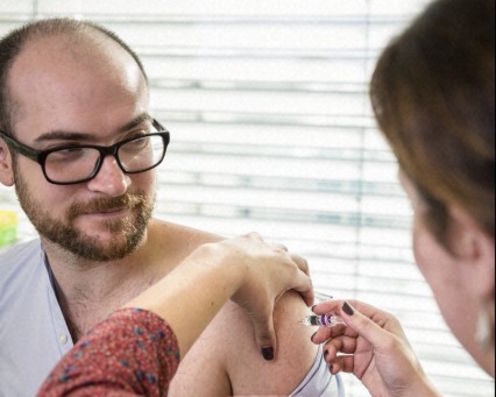
Health was not one of the winners of Tuesday night’s big-spending federal budget, but one initiative tucked away in the budget papers is worthy of applause – the establishment of an adult immunisation register and the expansion of the childhood register to include adolescents.
The budget papers say immunisation data collection will be expanded to include school-based adolescent vaccinations and that an adult register will be established from September 1, 2016.
The move means that we will soon record all vaccinations delivered to adolescents and adults through the government-funded National Immunisation Program (NIP). The program covers the cost of vaccines, but not all the recommended shots are on the NIP.
Existing register
Australia already has an immunisation register for children. The Australian Childhood Immunisation Register (ACIR) is the envy of many countries around the world. It was established in 1996 and, after a shaky start, now provides accurate data on the immunisation status of all registered children under seven years old.
The register also provides data for the regular reporting of immunisation coverage, with data available by state, regions within the states, Indigenous status and age group. This allows gaps in vaccine coverage to be highlighted and, in turn, for targeted interventions to improve uptake. The adult register could perform a similar role.
Recognising how well the ACIR has allowed monitoring of vaccine coverage for children, many clinicians and public health workers have long advocated having the same information available for adolescents and adults.
Adult vaccinations will be recorded, potentially for every Australian adult, and this information could well become part of the new opt-out e-health record.
Getting the adult register going
Before the ACIR was established, the call for its establishment was a recurring theme at the immunisation conferences sponsored by the Public Health Association of Australia. It’s been exactly the same with the adult immunisation register.
For at least ten years now, one of the resolutions at every immunisation conference has been the establishment of an adult immunisation register. But most of us supporting these resolutions did not think the idea had much traction in Canberra. So, the announcement has been something of a welcome surprise.
Still, it’s probably an idea whose time has come, given the increasing number of vaccines recommended for adolescents and adults in Australia.
The influenza and pneumococcal vaccinations have been recommended for adults for a long time. Originally targeted at older people, influenza vaccines are now recommended much more widely and are funded for people of any age with an existing illness, such as heart or lung disease, that may increase the risk of serious illness.
But data on uptake are sparse and there are unresolved questions about the impact of these vaccines. Knowing precise coverage may help resolve these problems.
A new vaccine against shingles (Herpes zoster) has recently been recommended for older people, as recognition of the burden this virus poses. It has been funded in the budget for adults between 71 to 79 years old, with an opportunity for a catch-up after November 2016.
Vaccines for adolescents
Adolescents and young adults are encouraged to receive the human papilloma virus (HPV) vaccine to prevent specific strains of genital warts and reduce the risk of cervical cancer in women. Australia has led the world with the roll-out of this vaccine. Collecting data on the initiative will be critical to understand population coverage and identify coverage gaps.
Measles has been eliminated for Australia, which means there’s no strain of this virus circulating for more than a year. But because the virus is circulating elsewhere in the world, it can be imported into the country, often via young adult returning travellers.
The initiatives announced in the budget would allow monitoring of measles vaccine status in young adults, as the current childhood vaccination register allows monitoring in children. Along with other strategies related to measles control, this may well turn out to be important in maintaining Australia’s measles elimination status.
If unexpected disease outbreaks occur, as there have been for whooping cough (pertusis), immunisation registers will help us determine whether it’s due to low vaccine coverage. Given new recommendations for adult vaccination against whooping cough, it will be just as important to know the proportion of adults who are vaccinated as it is to know how many children are.
It is hard to see a downside for these initiatives. But whether it will be enough of a sweetener to compensate for the cuts that have been flagged for the overall health budget remains to be seen.
Heath Kelly does not work for, consult to, own shares in or receive funding from any company or organisation that would benefit from this article, and has no relevant affiliations.
